This is part of a series of posts aiming to compile magisterial teachings and decisions on various doctrinal and disciplinary subjects. For other posts in this series see the growing list on the sidebar, or click on the 'Roma dixit' (Rome has spoken) label at the bottom of this post.
 Council of Trent, Session IV, Decree Concerning the Canonical Scriptures, 1546.
Council of Trent, Session IV, Decree Concerning the Canonical Scriptures, 1546.
The sacred and holy, ecumenical, and general Synod of Trent, - lawfully assembled in the Holy Ghost, the same three legates of the Apostolic See presiding therein, - keeping this always in view, that, errors being removed, the purity itself of the Gospel be preserved in the Church; which (Gospel), before promised through the prophets in the holy Scriptures, our Lord Jesus Christ, the Son of God, first promulgated with His own mouth, and then commanded to be preached by His Apostles to every creature, as the fountain of all, both saving truth, and moral discipline; and seeing clearly that this truth and discipline are contained in the written books, and the unwritten traditions which, received by the Apostles from the mouth of Christ himself, or from the Apostles themselves, the Holy Ghost dictating, have come down even unto us, transmitted as it were from hand to hand; (the Synod) following the examples of the orthodox Fathers, receives and venerates with an equal affection of piety, and reverence, all the books both of the Old and of the New Testament - seeing that one God is the author of both - as also the said traditions, as well those appertaining to faith as to morals, as having been dictated, either by Christ's own word of mouth, or by the Holy Ghost, and preserved in the Catholic Church by a continuous succession.
Council of Vatican I, Session III, On Revelation, 1870.
The complete books of the old and the new Testament with all their parts, as they are listed in the decree of the said council [Trent] and as they are found in the old Latin Vulgate edition, are to be received as sacred and canonical. These books the church holds to be sacred and canonical not because she subsequently approved them by her authority after they had been composed by unaided human skill, nor simply because they contain revelation without error, but because, being written under the inspiration of the holy Spirit, they have God as their author, and were as such committed to the church. Now since the decree on the interpretation of holy scripture, profitably made by the council of Trent, with the intention of constraining rash speculation, has been wrongly interpreted by some, we renew that decree and declare its meaning to be as follows: that in matters of faith and morals, belonging as they do to the establishing of christian doctrine, that meaning of holy scripture must be held to be the true one, which holy mother church held and holds, since it is her right to judge of the true meaning and interpretation of holy scripture. In consequence, it is not permissible for anyone to interpret holy scripture in a sense contrary to this, or indeed against the unanimous consent of the fathers.
Pope Leo XIII, Providentissimus Deus,
1893.
5. For the Sacred Scripture is not like other books. Dictated by the Holy Ghost, it contains things of the deepest importance, which in many instances are most difficult and obscure.
20. But it is absolutely wrong and forbidden, either to narrow inspiration to certain parts only of Holy Scripture, or to admit that the sacred writer has erred... For all the books which the Church receives as sacred and canonical, are written wholly and entirely, with all their parts, at the dictation of the Holy Ghost; and so far is it from being possible that any error can co-exist with inspiration, that inspiration not only is essentially incompatible with error, but excludes and rejects it as absolutely and necessarily as it is impossible that God Himself, the supreme Truth, can utter that which is not true.
20. Because the Holy Ghost employed men as His instruments, we cannot therefore say that it was these inspired instruments who, perchance, have fallen into error, and not the primary author. For, by supernatural power, He so moved and impelled them to write - He was so present to them - that the things which He ordered, and those only, they, first, rightly understood, then willed faithfully to write down, and finally expressed in apt words and with infallible truth. Otherwise, it could not be said that He was the Author of the entire Scripture. Such has always been the persuasion of the Fathers. "Therefore," says St. Augustine, "since they wrote the things which He showed and uttered to them, it cannot be pretended that He is not the writer; for His members executed what their Head dictated." And St. Gregory the Great thus pronounces: "Most superfluous it is to inquire who wrote these things - we loyally believe the Holy Ghost to be the Author of the book. He wrote it Who dictated it for writing; He wrote it Who inspired its execution."
21. It follows that those who maintain that an error is possible in any genuine passage of the sacred writings, either pervert the Catholic notion of inspiration, or make God the author of such error.
8. You will not find a page in his writings which does not show clearly that he [St. Jerome], in common with the whole Catholic Church, firmly and consistently held that the Sacred Books - written as they were under the inspiration of the Holy Spirit - have God for their Author, and as such were delivered to the Church. Thus he asserts that the Books of the Bible were composed at the inspiration, or suggestion, or even at the dictation of the Holy Spirit; even that they were written and edited by Him. Yet he never questions but that the individual authors of these Books worked in full freedom under the Divine afflatus, each of them in accordance with his individual nature and character.
16. St. Jerome's teaching on this point serves to confirm and illustrate what our predecessor of happy memory, Leo XIII, declared to be the ancient and traditional belief of the Church touching the absolute immunity of Scripture from error: "So far is it from being the case that error can be compatible with inspiration, that, on the contrary, it not only of its very nature precludes the presence of error, but as necessarily excludes it and forbids it as God, the Supreme Truth, necessarily cannot be the Author of error."
19. For while conceding that inspiration extends to every phrase - and, indeed, to every single word of Scripture - yet, by endeavoring to distinguish between what they style the primary or religious and the secondary or profane element in the Bible, they claim that the effect of inspiration - namely, absolute truth and immunity from error - are to be restricted to that primary or religious element. Their notion is that only what concerns religion is intended and taught by God in Scripture, and that all the rest - things concerning "profane knowledge," the garments in which Divine truth is presented - God merely permits, and even leaves to the individual author's greater or less knowledge. Small wonder, then, that in their view a considerable number of things occur in the Bible touching physical science, history and the like, which cannot be reconciled with modern progress in science!
21. He [Leo XIII] also teaches that Divine inspiration extends to every part of the Bible without the slightest exception, and that no error can occur in the inspired text: "It would be wholly impious to limit inspiration to certain portions only of Scripture or to concede that the sacred authors themselves could have erred."
3. Finally it is absolutely wrong and forbidden "either to narrow inspiration to certain passages of Holy Scripture, or to admit that the sacred writer has erred," since divine inspiration "not only is essentially incompatible with error but excludes and rejects it as absolutely and necessarily as it is impossible that God Himself, the supreme Truth, can utter that which is not true. This is the ancient and constant faith of the Church."
22. To return, however, to the new opinions mentioned above, a number of things are proposed or suggested by some even against the divine authorship of Sacred Scripture. For some go so far as to pervert the sense of the Vatican Council's definition that God is the author of Holy Scripture, and they put forward again the opinion, already often condemned, which asserts that immunity from error extends only to those parts of the Bible that treat of God or of moral and religious matters.
Council of Vatican II, Session VIII, Dei Verbum, 1965.
11. Those divinely revealed realities which are contained and presented in Sacred Scripture have been committed to writing under the inspiration of the Holy Spirit. For holy mother Church, relying on the belief of the Apostles (see John 20:31; 2 Tim. 3:16; 2 Peter 1:19-20, 3:15-16), holds that the books of both the Old and New Testaments in their entirety, with all their parts, are sacred and canonical because written under the inspiration of the Holy Spirit, they have God as their author and have been handed on as such to the Church herself. In composing the sacred books, God chose men and while employed by Him they made use of their powers and abilities, so that with Him acting in them and through them, they, as true authors, consigned to writing everything and only those things which He wanted. Therefore, since everything asserted by the inspired authors or sacred writers must be held to be asserted by the Holy Spirit, it follows that the books of Scripture must be acknowledged as teaching solidly, faithfully and without error that truth which God wanted put into sacred writings for the sake of salvation.
 Pope Benedict's appointment of bishop Earl Boyea as the new Ordinary of the Diocese of Lansing has caught the attention of some of our favorite Catholic blogs. There is widespread enthusiasm for this appointment especially on account of the bishop's record of friendliness toward Tradition. As I believe I've mentioned, Lisa and I heard at least one Mass offered by him at St. Josaphat's in Detroit, where he offers the Traditional Latin Mass regularly. Here are some links to see what others are saying - a couple of days old already, of course, but no less interesting I hope.
Pope Benedict's appointment of bishop Earl Boyea as the new Ordinary of the Diocese of Lansing has caught the attention of some of our favorite Catholic blogs. There is widespread enthusiasm for this appointment especially on account of the bishop's record of friendliness toward Tradition. As I believe I've mentioned, Lisa and I heard at least one Mass offered by him at St. Josaphat's in Detroit, where he offers the Traditional Latin Mass regularly. Here are some links to see what others are saying - a couple of days old already, of course, but no less interesting I hope.

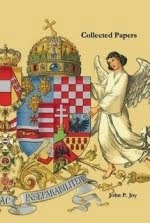
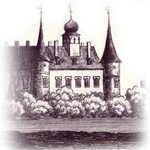


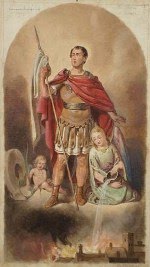
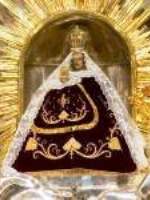
















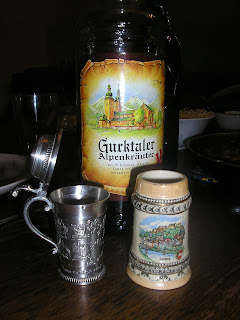





 Maria and Rupert later this morning while Lisa was in class learning about John Paul II's Theology of the Body.
Maria and Rupert later this morning while Lisa was in class learning about John Paul II's Theology of the Body.














